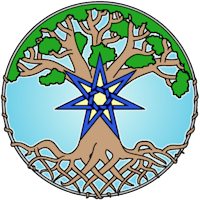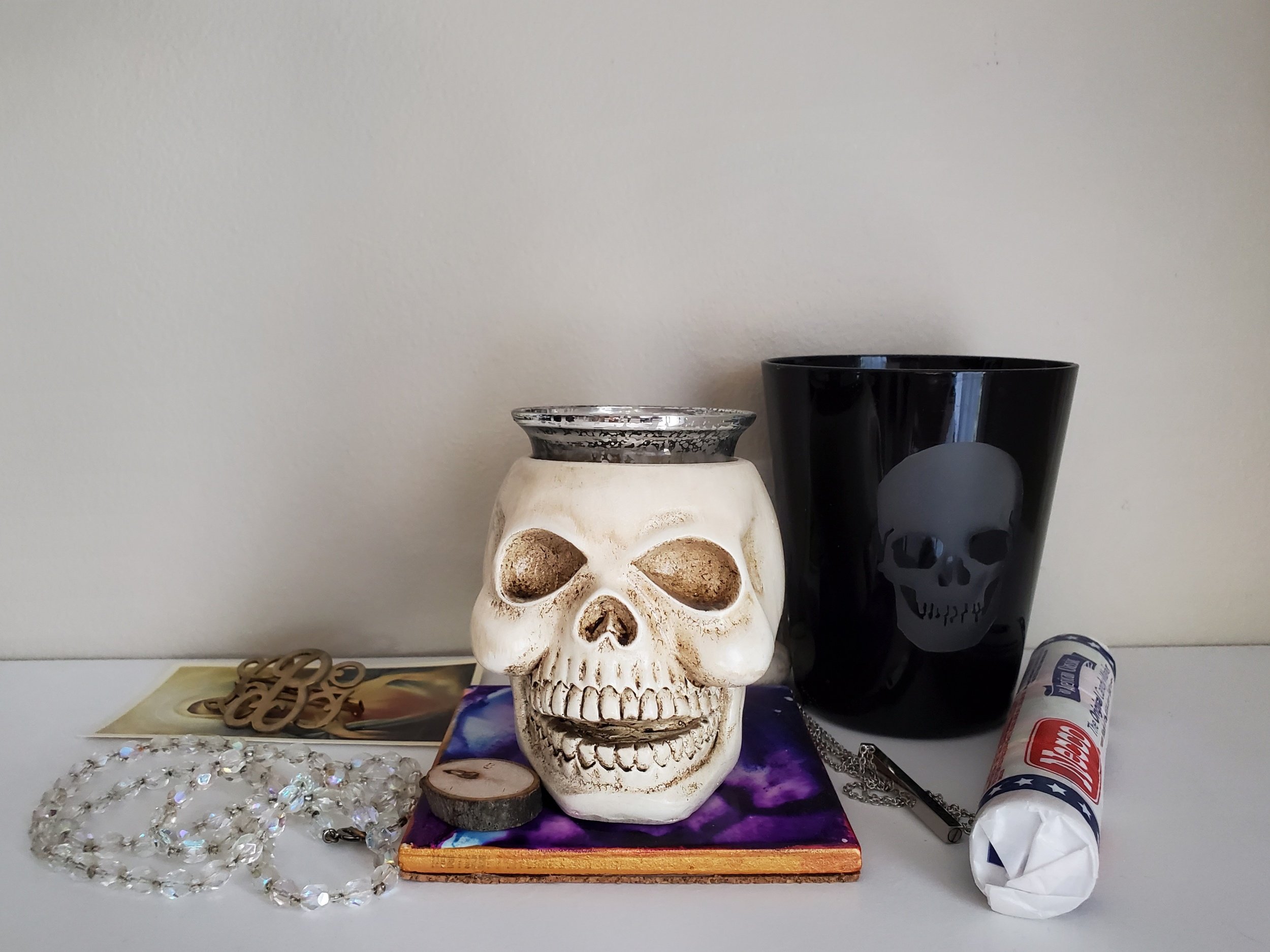Last Sunday, John Beckett wrote a blog titled “We Owe Toxic Ancestors Nothing”, and it spurred a lot of reactions, and thoughts, and commentary (as all his best blogs do). After Sara Amis responded with a blog of their own, “A Theological Argument for Ancestor Reverence”, Beckett wrote a follow-up, “A Pagan Theology of the Dead”. It’s mostly that last one that sparked the blog I’ve written below, but if you haven’t read all three, go do that first. I’ll wait!
While I agree with the broad strokes of Beckett’s first blog, where he and Amis disagree, my own experiences have given me opinions closer to Amis’s. Most of the Ancestors and Beloved Dead I’ve encountered — my own, and those of others I’ve assisted in my healing work and my spae-craft tradition(1) — do seem to have a tangible shift in perception after they pass over, especially if they were skeptical of a life after death, or if illnesses (physical but also mental) contributed heavily to their outlook and attitudes. Who are they, when they are free of their pain?
I don’t think there’s an easy answer that covers every situation and every ancestor — they’re not all suddenly sunshiney helpful loving people, but they might not be as toxic as they were when they were alive, either. I think it’s best to figure out your own boundaries with each individual. Some of them might be truly sorry for the pain and suffering they caused and may have both the willingness and the ability to help you now. Some may not even answer when you call. That isn’t to say that you need to reach out to everyone — I agree with Beckett that you probably shouldn’t try that with anyone you’re likely to find triggering — but not everything is such a hard line, and you may want to meet with someone in your grey areas before you decide if they’re going to be welcome at your altar.
For example: one of my mother’s uncles was a bit of a hellion in life, and died by suicide. I did not expect to meet him in my journeys, as he died before I was born, but nonetheless he showed up and revealed to me that he’d found his peace and had become something of a family psychopomp. I suddenly remembered my maternal grandmother telling me that her mother (my great-grandmother and the mother of that great-uncle), had told her about a strange dream she’d had a week before her death, where she saw her son and he held her hand as they walked up to a door. Pieces fell into place, and I had a new understanding of what kind of Ancestor my great-uncle had become.
You probably should try to include anyone who was supporting and loving to you in life, even if you weren’t open about your practice before they passed. See what kind of set up will make them most at ease, but it may surprise you: people who were very religiously orthodox in life may have slightly broader opinions about what kind of truths are possible, now that they’ve passed on. Just the fact that you’ve managed to contact them might help shift their perspective. Additionally, I often find that ancestors who are uncomfortable with the idea of tarot are more willing to use simple oracle cards(2), and many who balk at talk of “offerings” will nonetheless accept a cup of coffee.
It’s also important to reiterate that we all have so many more ancestors than we think about, so even if you can’t or won’t talk to the last two or three generations of your blood ancestors, you can call upon any of ancestors who have done the work of integration and healing necessary to become “Big A” Ancestors: spirits who can and will help and support you in both your magical and your mundane life. These are the ones you should turn to for help, and to keep your other ancestors in line, as you and they work to clear generational trauma, either by conscious effort, or just by you living the best life you can.
When you’re beginning to work with the Dead, you need to come to the table with an open mind, rather than preconceived notions, which may limit your ability to reach the Ancestors who may be the best fit for you. I often hear people say “none of my ancestors were queer” but I find it almost impossible to believe that none of our ancestors were queer, even in the modern period. No one was bisexual? No one was asexual? No one was gay or trans but closeted? And that same line of reasoning works for “they would all tell me I’m going to burn in hell for doing witchcraft”. Really? None of your ancestors ever practiced folk magic of any type? Don’t judge your entire lineage by the living members of your family! You may be surprised who you find when you reach out.
For example, I was in a ritual (led by others) a few years ago that called on a number of different Goddesses that are associated with Crones or Death, and during it we were told to reach out to our ancestors, and I had a sudden wish to meet someone, anyone, who “would recognize their craft in my own.” As much as I try not to have expectations, I did sort of expect someone from my Irish or Scottish family lines, considering how much of my craft involves the Fair Folk, but instead Baba Yaga showed up in her chicken-legged hut, and beckoned me inside where I met an Ancestor I now call “Babcia L”(3), a cunning woman and herbwife from the Slavic side of my family instead. While I have a vague idea of the geographic location and century she lived in, I have no idea what her days of birth or death are, so while I honor most of my Beloved Dead (those whom I knew in life) on their birth and death days, I decided to honor my Babcia L on her name day instead, which is a customary day of celebration in a lot of Eastern European countries.
It’s also worth mentioning that the Ancestors you honor don’t even have to be blood relatives. They could be pioneers in your field, trailblazers who began the activism you’re continuing, artists whose art inspires your own. A lot of deceased celebrities become folk heroes, and I think that’s how it has always worked, in ancient Greece and also today. One of my friends, Ron Padrón of White Rose Witching, has a great blog that does regular Queer Ancestor spotlights, and it’s been super inspiring for people who normally shy away from ancestor work due to bad experiences in their family of origin. Honoring your ancestors shouldn’t have to be painful or triggering; you can have boundaries with the Dead just the same as we have boundaries with the living.
I agree with the assertion in Beckett’s second blog, that the Dead have things to be doing: the work of integration and healing and sorting themselves out, and whatever else is necessary. That they are “busy” would make a certain amount of sense for why they are sometimes hard to reach. I also believe in reincarnation, and that some of us will reincarnate repeatedly in the same family line; that makes sense to me, and fits somewhat with what I’ve experienced. However, when we have these discussions about who the Dead are, and whether they’re a Higher-Self/Soul wearing a mask or if the personality itself is somehow surviving, while I see lots of discussion of a multiplicity of souls (which is my general impression given my experiences, but I’m agnostic as to how many souls and what sort of system), I don’t normally see much discussion of one thing I think is absolutely crucial to our understanding of the Dead and how they may or may not change: mythic time.
I do not believe the Dead and the lands of the Dead flow in time the same way that we do in our mundane world. I think it’s entirely possible that when we are contacting one of our Beloved Dead, known to us well in life but passed on, the whole time they are watching us and interacting with us and coming to our altars which for us is decades, may be but a few moments to them. And the reverse could be true as well: they may spend what seems to them an eon learning to integrate and heal in order to help their descendants, and then when they finally emerge from that work to speak with us and guide us, we perceive it as only a few months since their passing. And those two examples are only of two timelines in parallel relationship: we may also have to consider that time is not linear in the Otherworlds, that there many not be what we’d recognize as a clear progression of time.
I see more discussion about mythic time when we speak about the Gods: most of us have probably heard the questions about how someone can honor two Gods at the same altar when we have lore about a quarrel between Them, and perhaps seen someone answer that the two also have stories where They are allies, and that their UPG leads them to believe that despite the stories, the two Gods are contented to receive offerings together. Time does not constrain the Gods — they move through it or outside of it as they please — and I believe the same can be said for both the Fair Folk and the Dead.
It can be difficult to think of time as something flexible and maybe even optional, instead of something abstract but concrete and unyielding, but I think when working with spirits generally and the Dead in particular, we need to release our grip on the “timeline”. As I’ve been known to quip: time is fake, ya’ll! Just do the work that needs doing.
Image for this post is of part of my home Ancestor shrine, featuring a resin skull shaped candle holder with glass insert, a black glass with a skull image on it, a few pieces of jewelry, a funeral card, and a roll of necco wafers.
Notes:
1. Spae is a verb in Middle English and Scots meaning “to see, predict, or foretell” and by spae-craft here I am referring to the practice of rituals done to receive wisdom from the Dead, derived from the Hrafnar tradition as outlined in Diana Paxson’s “The Way of the Oracle”, and modified slightly by my teachers when they founded the Potomac Seidr Guild Ondvegisulur.
2. I’ve used the Vintage Wisdom Oracle with good results, but I’m also developing a deck of my own: simple cards with words like “Compassion”,
”Regret”, and “Legacy”.
3. “L” here is an initial to stand in for the name I call her, but I did not want to share her whole name this publicly.

